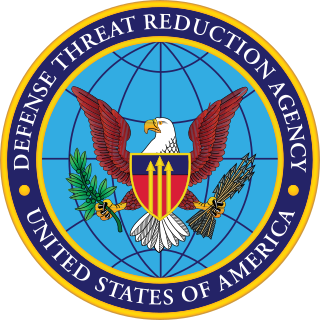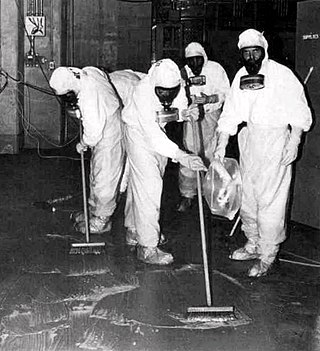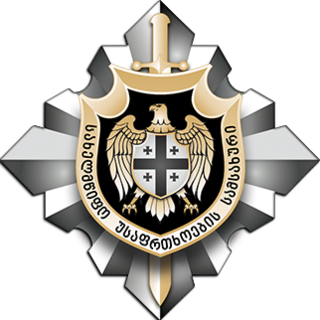
Counterterrorism, also known as anti-terrorism, relates to the practices, military tactics, techniques, and strategies that governments, law enforcement, businesses, and intelligence agencies use to combat or eliminate terrorism and violent extremism.

Nuclear terrorism is the use of a nuclear weapon as an act of terrorism. There are many possible terror incidents, ranging in feasibility and scope. These include the sabotage of a nuclear facility, the intentional irradiation of citizens, or the detonation of a radiological device, colloquially termed a dirty bomb, but consensus is lacking. According to the 2005 United Nations International Convention for the Suppression of Acts of Nuclear Terrorism nuclear terrorism is an offense committed if a person unlawfully and intentionally "uses in any way radioactive material … with the intent to cause death or serious bodily injury; or with the intent to cause substantial damage to property or to the environment; or with the intent to compel a natural or legal person, an international organization or a State to do or refrain from doing an act."

A nuclear and radiation accident is defined by the International Atomic Energy Agency (IAEA) as "an event that has led to significant consequences to people, the environment or the facility." Examples include lethal effects to individuals, large radioactivity release to the environment, or a reactor core melt. The prime example of a "major nuclear accident" is one in which a reactor core is damaged and significant amounts of radioactive isotopes are released, such as in the Chernobyl disaster in 1986 and Fukushima nuclear disaster in 2011.

Chemical, biological, radiological, and nuclear defense or Nuclear, biological, and chemical protection is a class of protective measures taken in situations where chemical, biological, radiological, or nuclear hazards may be present. CBRN defense consists of CBRN passive protection, contamination avoidance, and weapons of mass destruction mitigation.

The Defense Threat Reduction Agency (DTRA) is both a defense agency and a combat support agency within the United States Department of Defense (DoD) for countering weapons of mass destruction and supporting the nuclear enterprise. Its stated mission is to provide "cross-cutting solutions to enable the Department of Defense, the United States Government, and international partners to Deter strategic attack against the United States and its allies; Prevent, reduce, and counter WMD and emerging threats; and Prevail against WMD-armed adversaries in crisis and conflict." DTRA is headquartered in Fort Belvoir, Virginia. The DTRA mission, organization and management, responsibilities and functions, relationships, authorities, and administration are defined in DoD Directive 5105.62, Defense Threat Reduction Agency (DTRA).

Nuclear safety is defined by the International Atomic Energy Agency (IAEA) as "The achievement of proper operating conditions, prevention of accidents or mitigation of accident consequences, resulting in protection of workers, the public and the environment from undue radiation hazards". The IAEA defines nuclear security as "The prevention and detection of and response to, theft, sabotage, unauthorized access, illegal transfer or other malicious acts involving nuclear materials, other radioactive substances or their associated facilities".

Canadian Special Operations Forces Command is a command of the Canadian Armed Forces. It is responsible for all special forces operations that respond to terrorism and threats to Canadians and Canadian interests around the world.
Energoatom is the state enterprise operating all four nuclear power plants in Ukraine. It is the largest producer of electricity in Ukraine.
The counter-terrorism page primarily deals with special police or military organizations that carry out arrest or direct combat with terrorists. This page deals with the other aspects of counter-terrorism:

Ukraine operates four nuclear power plants with 15 reactors located in Volhynia and South Ukraine. The total installed nuclear power capacity is over 13 GWe, ranking 7th in the world in 2020. Energoatom, a Ukrainian state enterprise, operates all four active nuclear power stations in Ukraine. In 2019, nuclear power supplied over 20% of Ukraine's energy.
The National Nuclear Security Administration (NNSA) is a United States federal agency responsible for safeguarding national security through the military application of nuclear science. NNSA maintains and enhances the safety, security, and effectiveness of the U.S. nuclear weapons stockpile; works to reduce the global danger from weapons of mass destruction; provides the United States Navy with safe and effective nuclear propulsion; and responds to nuclear and radiological emergencies in the United States and abroad.

The Deployable Specialized Forces (DSF) —formerly Deployable Operations Group— are part of the United States Coast Guard that provide highly equipped, trained and organized deployable specialized forces, to the Coast Guard, United States Department of Homeland Security (DHS), United States Department of Defense (DoD) and inter-agency operational and tactical commanders. The command was formerly headquartered in Arlington, Virginia where it was established on 20 July 2007, and was commanded by a captain. It was decommissioned by the Commandant of the Coast Guard, Admiral Robert J. Papp Jr. on 1 October 2013, with units previously assigned to the DOG being split between Coast Guard Pacific and Atlantic Area commands. The units were subsequently reorganized under Deployable Specialized Forces (DSF).

The National Guard of Ukraine is the Ukrainian national gendarmerie and internal military force. It is part of the Ministry of Internal Affairs, responsible for public security. Originally created as an agency under the direct control of the Verkhovna Rada on 4 November 1991, following Ukrainian independence, it was later disbanded and merged into the Internal Troops of Ukraine in 2000 by President Leonid Kuchma as part of a "cost-saving" scheme. Following the 2014 Revolution of Dignity, amidst the Russian intervention, the National Guard was re-established, and the Internal Troops were disbanded.
Vladimir Zakhmatov is an independent expert at the international level of explosions and fire-fighting, well-known scientist in the field of physics of combustion and explosion, developer of modern impulse fire-extinguishing devices and systems, Doctor of Engineering Sciences, Professor, active member of the International Academy of Ecology and Safety , the New York Academy of Sciences (USA), Ukrainian Academy of Life Safety (Ukraine).

The State Security Service of Georgia (SSSG) is a state intelligence agency of Georgia, under the authority of the Government, which covers a broad spectrum of tasks to preserve national security in accordance to state legislature and relevant laws. Its missions are to protect the constitutional order, sovereignty, territorial integrity and military potential of Georgia from illegal acts of special services and individuals of foreign countries; to prevent violent and unconstitutional change of order and state authority. Further it is to ensure economic security and fight terrorism on national and international level, transnational organized crime and international crime as well as carry out measures towards prevention, detection and suppression of corruption.
The National Special Operations Force (NSOF) has been Malaysia's main security force which serves as the first responder to any terror threats on the country's sovereignty after October 2016. The force covers elements from the Malaysian Armed Forces, Royal Malaysia Police and the Malaysian Maritime Enforcement Agency.

The Troops of Radiological, Chemical and Biological Defence of the Russian Armed Forces are an organisation designed to reduce the losses of the Ground Forces and ensuring their combat tasks assigned during operations in conditions of radioactive, chemical and biological contamination, as well as at enhancing their survivability and protection against high-precision and other weapons.

The Belarusian Ground Forces, also called the Belarusian Army in English, is the land warfare service branch of the Armed Forces of Belarus.

During the Russian invasion of Ukraine, the Chernobyl Exclusion Zone was captured on 24 February 2022, the first day of the invasion, by the Russian Armed Forces, who entered Ukrainian territory from neighbouring Belarus and seized the entire area of the Chernobyl Nuclear Power Plant by the end of that day. On 7 March, it was reported that around 300 people were trapped and had been unable to leave the power plant since its capture. On 31 March, it was reported that most of the Russian troops occupying the area had withdrawn, as the Russian military abandoned the Kyiv offensive to focus on operations in Eastern Ukraine.

The 1st Nuclear Power Plant Defense Battalion is a battalion of the National Guard of Ukraine tasked with CBRN defense especially in the Chernobyl Exclusion Zone in the aftermath of the Chernobyl Disaster and has therefore seen combat against Russian forces during the Capture of Chernobyl amidst the Russian invasion of Ukraine with 169 soldiers of the Battalion being taken captive. In its current form, it was established in 1991 and headquartered at Slavutych.















